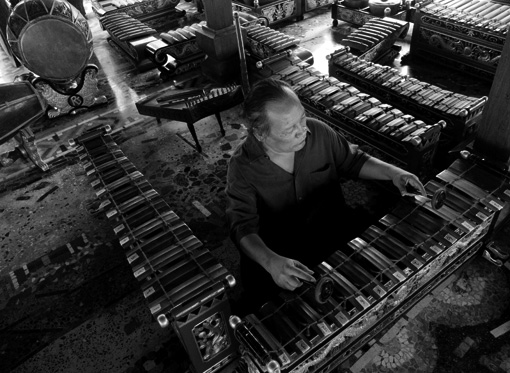
Rahayu Supanggah (b. 1949). Known for his role in the international collaboration Realizing Rama and for the musical scores he composed for Opera Jawa and Robert Wilson’s I La Galigo, Rahayu Supanggah is considered one of the pioneers of contemporary music in Indonesia. A professor of ethnomusicology and composition, he is an internationally acclaimed musician, composer, performer, and curator who seeks to explore, experiment, and create new musical genre. After obtaining his doctorate in ethnomusicology from Universite de Paris VII (1985) he became an artist-in-residence in New York (1991), Paris (2003-2006), London (2007-2010), and Seattle (2010), he went on to collaborate with well known directors and musicians including Warner Kaegi, Robert Wilson, Sergio Leone, Rhoda Grauer, Alec Roth, Neill Sorrel, Alain Recoing, Toshi Tsuchitori, Ong Ken Sen, Ramli Ibrahim, Denisa Reyes, André Gingras, Kronos Quartet, Portico Jazz Quartet, Plaid. Jarrad Powel, Per Brahe, Andy Lee Rich, Sardono W. Kusuma, Marseli Sumarno, Jun Saptohadi, Garin Nugraho, Restu Imansari, Anna Avantie, Rama Suprapto, and Kavita Khrisnan. Appearances include the Next Wave Festival at BAM New York, the Lincoln Center in New York, the BBC Prom Concert Series at the Royal Albert Hall in London, the Ether Festival at the Queen Elizabeth Hall in London, the Esplanade in Singapore, Bunkamura Theatre in Tokyo, the Grand Theatre in Pyong Yang, Het Muziektheatre in Amsterdam, Opera de Paris, Ravenna Opera House, the Melbourne Festival, the Schiller Theater, and Haus die Kulturen der Welt in Berlin. Rahayu’s award-winning compositions reflect traditional Javanese karawitan, contemporary Indonesian music rooted in the traditional music of various regions of Indonesia and Asia, concert music, as well as music for dance, theatre, and film. Rahayu’s various collaborations have also seen him further his knowledge of traditional Japanese and French music. “Music is more than just aesthetics,” he says. “It’s also cultural makeup. It’s a philosophy of life.”